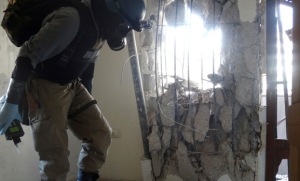 A UN inspector at one of the sites of the Aug. 21 chemical weapons attack in the Damascus suburb of Zamalka.
A UN inspector at one of the sites of the Aug. 21 chemical weapons attack in the Damascus suburb of Zamalka.
By Daryl G. Kimball
There are no international laws against war itself, but there are rules about how wars can and cannot be conducted.
Chemical weapons are particularly gruesome, inhumane, and indiscriminate--affecting combatants and noncombatant civilians alike. For these and other reasons, their use has been outlawed worldwide for over 90 years--since the horrors of WWI trench warfare and the Geneva Protocol of 1925, which is one of the most important pillars of international law. Almost all the world's countries are members of the Chemical Weapons Convention (CWC), which bans all development, production, and deployment of deadly chemical arms and requires the verifiable destruction of remaining stockpiles.
In July 2012, the Syrian government publicly acknowledged the existence of its chemical arsenal for the first time. Assad's forces are known to possess (and are responsible for maintaining control over) hundreds of tons of blister agents, including mustard gas, and nerve agents, including sarin and VX. Its stockpile is deliverable by aerial bombs, ballistic missiles, and artillery rockets.
Syria is not only bound by the Geneva Protocol of 1925 not to use chemical agents in warfare, including in non-international armed conflicts.. The use of chemical weapons is also a war crime under the Statute of the International Criminal Court (ICC). The UN Security Council can refer such war crimes to the ICC even if the persons responsible are citizens of a state that has not ratified the ICC statute.
The evidence is overwhelming that Bashar al-Assad's forces are using Sarin. The August 30 U.S. intelligence community assessment on the use of chemical weapons in Syria on August 21 says that the intelligence community has "high confidence" that the Syrian government used chemical weapons against the opposition elements in Damascus and that the regime used chemical weapons "multiple times" over the past year.
Sarin produces a slow and painful death. Invented by the Germans in the 1930s, Sarin is a colorless, odorless liquid that enters the body and attacks the nervous system. Even a minor exposure can be lethal. Sarin poisoning first leads to a runny nose, excess saliva, pinpoint pupils, and shortness of breath, followed by profuse sweating, stomach cramps, and uncontrollable muscle twitches followed by loss of consciousness. The Sarin then begins to shut down key brain functions, leading to paralysis of the respiratory muscles and death by asphyxiation in minutes.
The use of nerve gas other types of deadly chemical agents as weapons clearly violates the established and widely accepted norms of the international community. Each time such rules are broken and there is an inadequate response, the risk that the some of the world's most dangerous weapons will be used to commit further atrocities increases.
For example, the failure of the United States in the 1980s to condemn and try to stop the use of chemical weapons by Saddam Hussein against Iran during their 1980-1988 war undoubtedly emboldened Saddam Hussein and opened the door to further attacks at the time.
And as the late Jonathan Tucker wrote in his authoritative 2007 book War of Nerves, the failure of the international community to adequately react at the time had "a deeply corrosive effect on the legal, political and moral norms constraining the spread of chemical weapons." In response, other countries in the Middle East, particularly Syria, pursued their chemical warfare capabilities.
Holding the line against further chemical weapons use is a core U.S. and international security interest because chemical weapons produce horrible effects, especially against unprotected civilians, and because the erosion of the taboo against chemical weapons use can lead to further, more significant use of these or other mass destruction weapons in the future.
